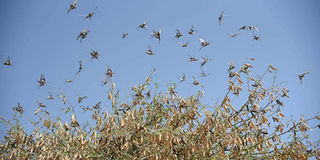Breaking News: At least 10 feared to have drowned in Makueni river
Our real emergency is the desert locust invasion, not BBI rallies

Locusts invade Kanukurmeri village in Turkana County, on January 20, 2020. Kenya had not experienced this level of locust invasion for nearly 70 years. PHOTO | FILE | NATION MEDIA GROUP
What you need to know:
- Politics is becoming our DNA and it is creating leadership that lacks compassion for the same people it is meant to care for.
- I’m only concerned how politics could be so damaging to the national psyche, dehumanise its leadership and render it emotionless.
I once met an Indian woman.
Not from India but with a sort of Amazonian heritage, more of Caribbean descent and originally from Mombasa.
Yes, I, too, got confused. She considered herself a fortune teller. She advised me never to complain as that was bad for the world.
I’m not sure which world she lived in but, if it is Kenya, then I’m justified to complain sometimes, to improve stuff.
Excuse me, Indian lady! I start with the locust invasion being ignored in favour of politics. With locusts ravaging our vegetation, including muguka, how can one not complain?
I hasten to add that I’m not a consumer of muguka or its posh relative miraa (khat). However, I feel for the many Kenyans who have turned to muguka to chew their sorrows away and risk losing their fix.
When locusts hit the northern counties, I thought, well, there is very little to eat in the desert, anyway, and they will head back home soon.
But they have since grown in numbers and upped their speed and headed towards the central parts of the country, one of our breadbaskets.
FOOD SECURITY
The last I read on the locusts was that they had been spotted in the Rift Valley, our even bigger breadbasket, in larger numbers. Panic set in for me then.
Sadly, our beloved leaders were still in the Building Bridges Initiative (BBI) stupor. Understandably, that is their emergency.
As they are busy politically self-preserving, locusts are about to render large swathes of the country food-insecure.
Kenya is just emerging from a lengthy drought that led to famine. The last thing we should do is ignore the locust invasion that is about to destroy crops and potentially lead to another famine.
A warning was issued of locust invasion as early as mid last year. However, little in terms of preparedness was done to counter the menace.
The Food and Agriculture Organisation (FAO) of the United Nations said Kenya had not experienced this level of locust invasion for nearly 70 years.
BBI POLITICS
It also warned that the current invasion was going to be ravaging and potentially lead to food insecurity.
For the record, Kenya attempted to send out a team to spray some parts of the country. Too little, too late.
The locusts have kept spreading and not much has been heard from the government on how it hopes to deal with the situation since the last aerial spraying.
BBI politics has, on the other hand, taken over the country. The launch of the BBI report last year at Bomas coincided with the deadliest floods engulfing the country.
Politics still took centre stage amid death and destruction from torrential rains in some of the poorest parts of the Rift Valley and coastal regions.
Politics is becoming our DNA and it is creating leadership that lacks compassion for the same people it is meant to care for.
It seems devoid of a human face. It’s unfeeling, unresponsive and, at times, cruel to the ordinary people, who bear the brunt of natural disasters.
POOR PRIORITIES
The response to emergency situations is too late, too little or none at all.
No wonder, the last response to famine in Turkana was ‘Let them die as they are used to dying anyway’!
That coming from the agency meant to counter drought in the country was very telling of our attitude in dealing with emergencies.
It’s not that we lack capacity; we just exhibit general lack of care. Government priorities sometimes go to projects that have little impact on ordinary people’s lives; they’re caught up between emergencies and inertia from the leaders.
Meeting after meeting is being held across the country by leaders who are either for or against BBI.
The airwaves are being colonised to discuss politics with BBI at the heart of it.
As our leaders trip over each other on BBI issues, no group has paused to ask whether they could put in similar effort to offer leadership in dealing with an emergency never experienced in the country in the past seven decades!
Lest one thinks I hold sway in one way or another, I’m ambivalent on BBI.
EMERGENCY RESPONSE
I’m only concerned how politics could be so damaging to the national psyche, dehumanise its leadership and render it emotionless.
FAO has organised an emergency meeting to raise funds to deal with the situation in the Horn and East Africa.
The least our government can do is to keep engaging with the public to reassure them of its support. That is a short-term plan.
In the long term, the country needs to create a model of dealing with emergencies with the Cabinet in the lead, and not letting some ministers with duty of care to save us from locusts join the BBI caravan.
The Cobra cabinet team in the UK and Fema in the US are a few emergency response models worth studying.
It seems our politicians are too intoxicated with power to remember their duty to wananchi. But politics does not need to hamper service delivery or our response to emergency situations.
Ms Guyo is a legal researcher. [email protected] @kdiguyo





